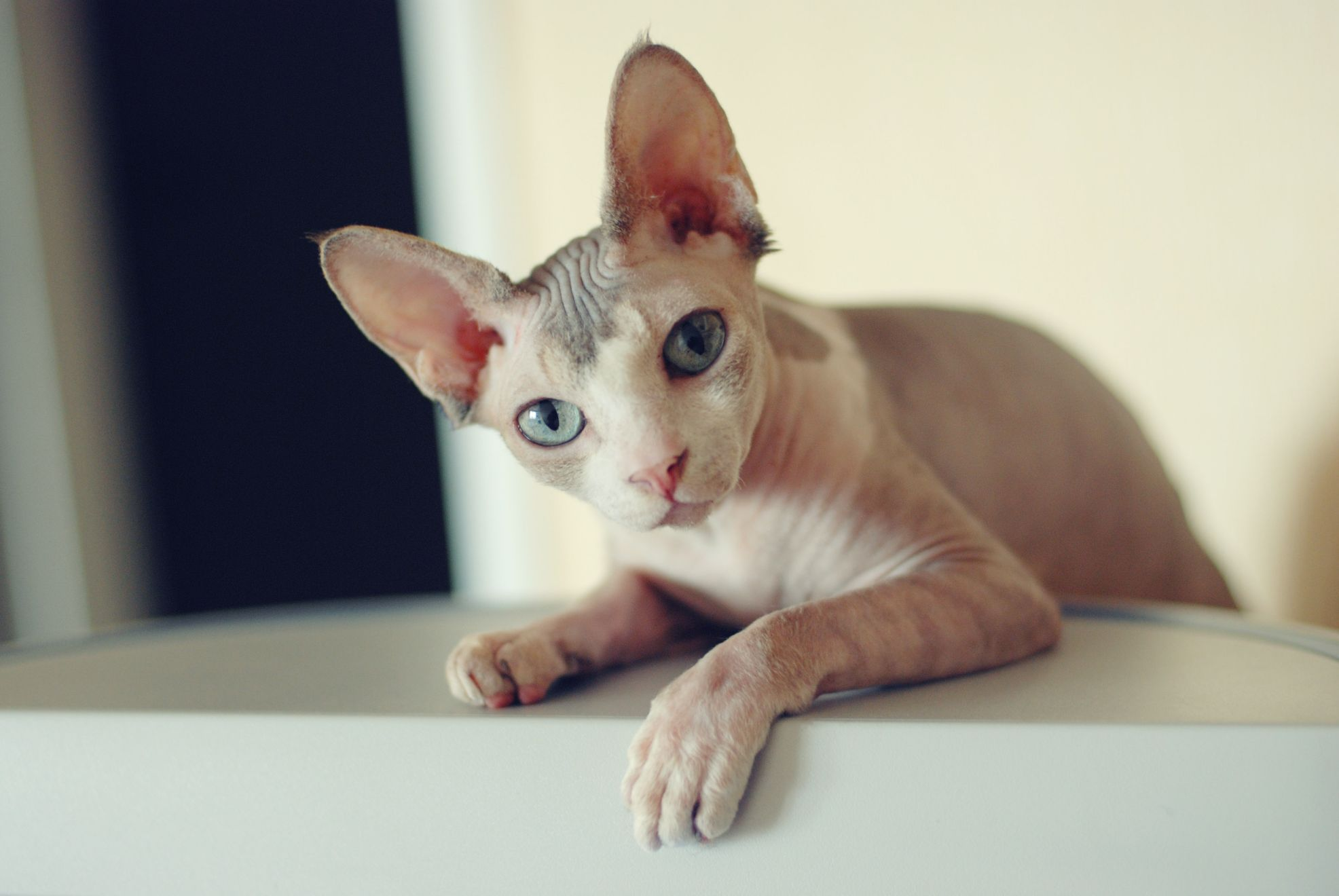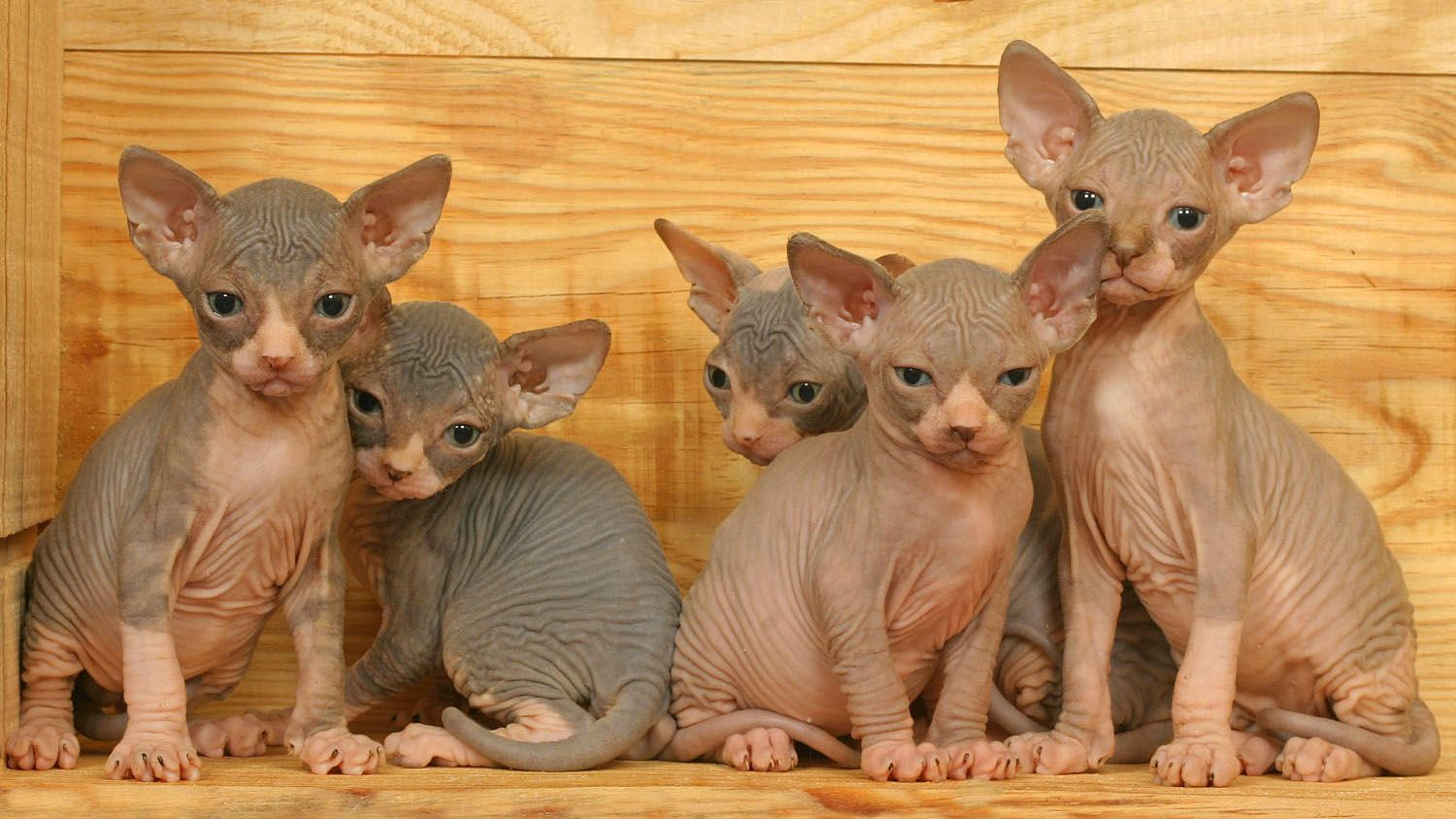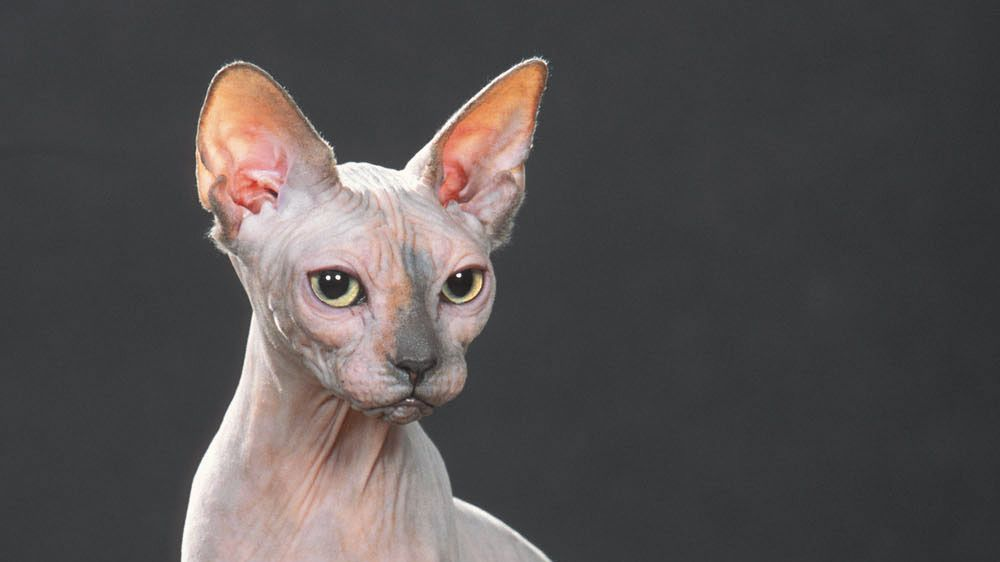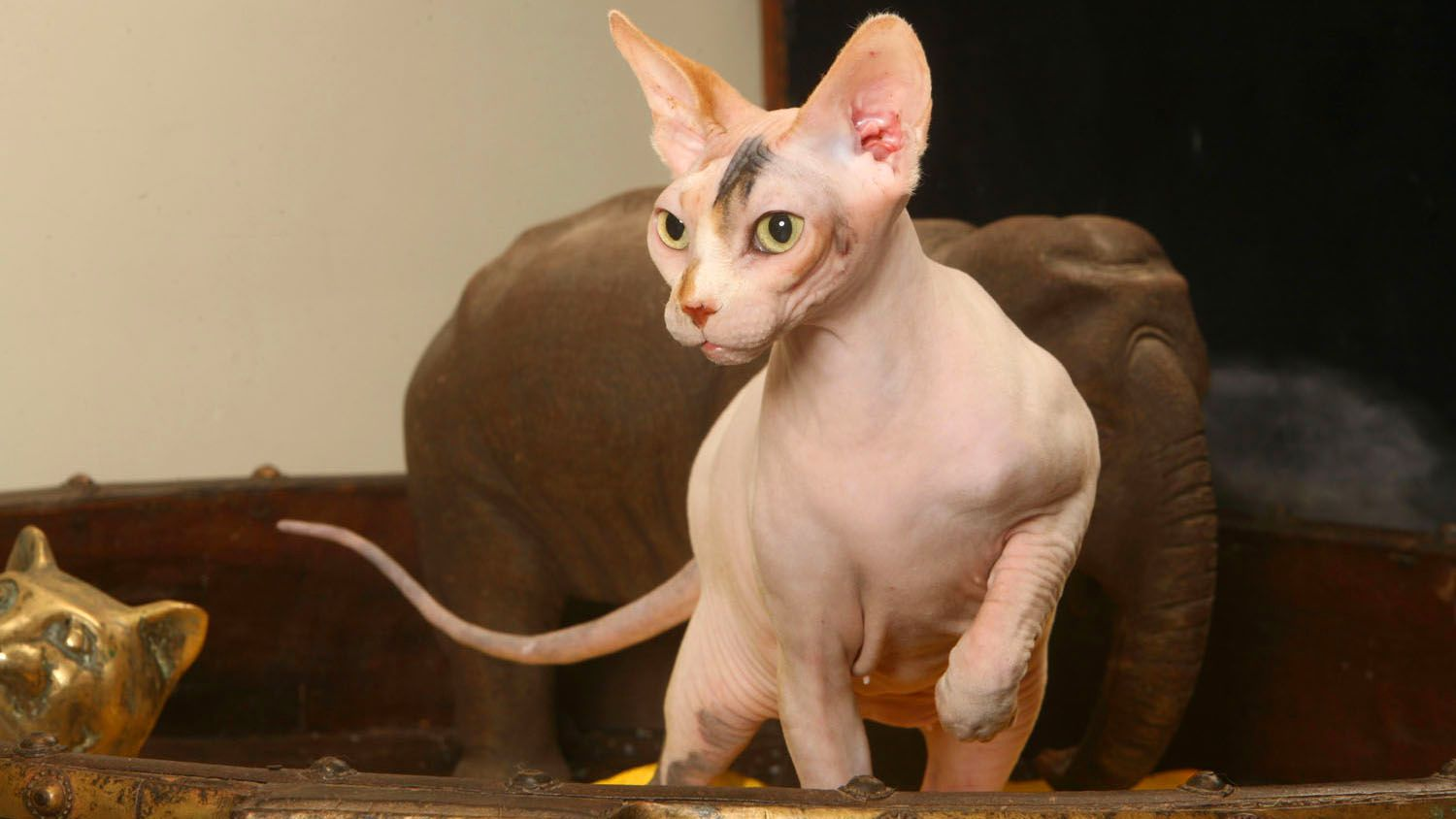Let's talk Sphynx
There is no mistaking the Sphynx cat. Unique among felines, the hairless breed is covered instead in a down-like coat flowing with sweet wrinkles. Highly personable and a mega-cuddler, lovers of the breed can’t get enough of their attentive characteristics. The Sphynx is fine if left alone but overjoyed to be with their humans, and will let you know in no uncertain terms when they need more attention.
Official name: Sphynx
Other names: Canadian Sphynx, Canadian Hairless Cat
Origins: Ontario, Canada
Grooming needs
3 out of 5Energy level*
4 out of 5Vocal
3 out of 5Environment (indoor/outdoor)
2 out of 5Family pet?*
5 out of 5Compatibility with other pets
5 out of 5Can be left alone
4 out of 5
| Male | Female |
|---|---|
| Height | Height |
| 8 - 10 in | 8 - 10 in |
| Weight | Weight |
| 8 - 14 lb | 6 - 12 lb |
| Life stages | |
|---|---|
| Kitten | Adult |
| 4 to 12 months | 1 to 7 years |
| Mature | Senior |
| 7 to 12 years | From 12 years |
Grooming needs
3 out of 5Energy level*
4 out of 5Vocal
3 out of 5Environment (indoor/outdoor)
2 out of 5Family pet?*
5 out of 5Compatibility with other pets
5 out of 5Can be left alone
4 out of 5
| Male | Female |
|---|---|
| Height | Height |
| 8 - 10 in | 8 - 10 in |
| Weight | Weight |
| 8 - 14 lb | 6 - 12 lb |
| Life stages | |
|---|---|
| Kitten | Adult |
| 4 to 12 months | 1 to 7 years |
| Mature | Senior |
| 7 to 12 years | From 12 years |

Get to know the Sphynx
All you need to know about the breed
Not all cats were created equal. With no real coat to speak of, the Sphynx is the most extra-ordinary of cat, and the most typical of atypical felines. Not just good but great natured, their doting expression shines out from lemon-shaped eyes crowned by inches-high ears. There’s no other way to put it: This is one cool cat.
Although the breed appears to be from the ancient world, they originate from the cold climes of Canada. In 1966, the first Sphynx cat was born to a domestic cat, and was nothing more than a genetic mutation. The breed has also been called by the name Canadian Hairless Cat.
The Sphynx cat temperament is divine. They are always up for a cuddle or a turn on your lap. Both lively and affectionate, the breed adores to be held and truly craves attention, and when they don’t receive it, will all but get in your face to ask for more. Not a huge talker, the breed is nonetheless communicative, all because they dig being part of the pack.
Now, about that coat. The Sphynx is encased in a soft, fine down-like topper that doesn’t have an equal in the animal kingdom. Think Chamois. The breed can at times be totally hairless as well, thus sporting skin and nothing else. Applying a vet-approved moisturizer is necessary to protect the coat.
As if all this wasn’t enough, the Sphynx cat fur comes in a variety of chic color combinations, ranging from blue, to black tortie and white, to red and white

Two facts about Sphynx
1. Not a "hypoallergenic" breed
Despite their lack of fur, the Sphynx cat is not a "hypoallergenic" breed - meaning possessing a coat that makes them non-allergy-provoking to the humans in their midst.
2. A live hot water bottle
One would think a cat without fur would be cold to the touch: not so the Sphynx. This is a cat that runs hot: the breed has a higher body temperature than other felines. Your cat will still need to be kept warm however for optimum health.
History of the breed
One look at the Sphynx’ cats unparallelled appearance and thoughts of exotic origins in the Far East come to mind. Actually, it’s just the opposite: They originate from Toronto, Canada. Not that Canada isn’t exotic, mind you. In 1966, the first known Sphynx was born to a domestic cat named Elizabeth, a unassuming black and white feline who produced a genetic mutation.
The kitten, known as Prune, was quickly bred by their owner with other hairless cats and the breed took hold. The Sphynx breed was crossed at that time with the Devon Rex, a breed emanating from England with similarly large ears and a very short coat. The hairless kittens, however, prevailed.
The Sphynx has been also called by the name Canadian Hairless Cat but eventually acquired the present name since their appearance compares to cat-like images found in ancient Egypt.
From head to tail
Physical characteristics of Sphynx
1.Ears
2.Head
3.Body
4.Tail
5.Coat

Things to look out for
From specific breed traits to a general health overview, here are some interesting facts about your Sphynx
They can be prone to cardiac problems
When properly bred, Sphynx cats are healthy and lead a robust life. The breed does, though, run the risk of hypertrophic cardiomyopathy, a cardiac condition that can be hereditary, characterised by a thickening of the walls of the heart. It sounds dangerous but is able to be controlled by medication if the condition arises. Make regular visits to your veterinarian to rule out any possibilities.
How hairless is she?
The interesting part about the hairlessness of the Sphynx cat is that there are different degrees of hairlessness. Some cats have the feel of suede, whereas others have a smooth, buttery sensation to their coat. Certain Sphynx possess slightly thicker patches of fur on their nose and ears or their toes and tail. The Sphynx’ covering is like a silky down, but in no way is there no hair at all.
Why the big belly?
The Sphynx anatomy is such that they are sound all around - even though they look fairly delicate. Perhaps it’s the absence of fur but they are in reality hardy cats, and that includes their mid-region.
Tailored nutrition for Sphynx

Tailored health nutrition has a fundamental role to play in maintaining the health and beauty of Sphynx cats. Food provides energy to help with vital functions and a complete nutritional formula for Sphynx should contain an adapted balance of nutrients. Feeding them in this way will offer a diet that’s neither deficient nor excessive, both of which could have adverse effects on your cat’s health.
Strong Immune System
Supports the development of the kitten’s healthy immune system with the inclusion of clinically proven antioxidants, including vitamins E and C.
Healthy Growth
At 4 months old, a kitten’s growth rate changes with rising energy levels to support growing bones and muscles. This formula contains an adapted level of protein, vitamins and minerals for the final stage of kittenhood until 1 year old.
Microbiome Support
Combination of prebiotics & highly digestible proteins to help promote a healthy balance of intestinal microbiota for digestive health.

The main nutritional goals for adult Sphynx are:
Stool Odor Reduction
A lack of exercise may lead to a slower intestinal transit which can result in smelly stools. Indoor Adult is formulated with highly digestible protein (L.I.P.*), an appropriate fiber content and specific nutrients to promote good digestion and help reduce the quantity and odor of stools. *Protein selected for its very high digestibility.
Moderate Calorie
A moderate fat content adapted to the lower activity of indoor cats to help maintain healthy weight.
Manages Hairballs
A combination of different types of fibers that encourages intestinal transit and helps facilitate the elimination of the hair your cat swallows every day.

A senior cat - one over the age of 12 - may sometimes have difficulties with absorption. To maintain the weight of the aging cat and minimise the risk of deficiency, they should be given an extremely digestible food filled with essential nutrients.
Weight Maintenance
In some senior cats, the level of activity reduces with age, which leads to weight gain. Aging Spayed/Neutered 12+ contains a moderate level of fat to help maintain an ideal body condition.
Healthy Aging Complex
An exclusive complex of antioxidants including lycopene and omega-3 fatty acids to support the body systems through the aging process.
Renal Health
Helps support healthy renal function with a moderate phosphorus level.
Enriched with L-Carnitine
L-Carnitine is involved in healthy fat metabolism.

Caring for your Sphynx
Grooming, training and exercise tips
That lithe body just looks trim and slim. Sphynx are in fact born athletes, and have a natural propensity to climb - especially to things way out of their reach. They are huge fans of play, not a cat to sit around and lollygag on the couch for ages. Their need for movement makes them ever more fascinating, and keeps them in shape to boot. The breed benefits from a high metabolism, which is a boon to their big appetite. A word of caution: whereas many cats get their exercise outside, this is one that should be kept indoors due to their delicate skin doing best being out of the sun.
The Sphynx cat fur may be less plentiful but that doesn’t mean they don’t need grooming - it just comes in a different form. Their down-like coat requires almost more attention than their fellow furry felines. Protect it best by slathering unscented oil or moisturizer on them frequently as per veterinarian recommendation, to make it soft and silky. The Sphynx’ skin falls in delicate folds over their body, and needs attention when bathing to keep it clean; in a pinch, baby wipes can help.
Known as a very affectionate breed, the Sphynx personality is an eager one, with the desire to please and to learn. This cat exhibits a high amount of intelligence and a huge amount of energy, traits that contribute to their taking discipline well. The Sphynx is super loyal, so the cat-human bond is one they enjoy and respect. Like all pets, they tend to respond best to training that includes positive reinforcement.
That lithe body just looks trim and slim. Sphynx are in fact born athletes, and have a natural propensity to climb - especially to things way out of their reach. They are huge fans of play, not a cat to sit around and lollygag on the couch for ages. Their need for movement makes them ever more fascinating, and keeps them in shape to boot. The breed benefits from a high metabolism, which is a boon to their big appetite. A word of caution: whereas many cats get their exercise outside, this is one that should be kept indoors due to their delicate skin doing best being out of the sun.
The Sphynx cat fur may be less plentiful but that doesn’t mean they don’t need grooming - it just comes in a different form. Their down-like coat requires almost more attention than their fellow furry felines. Protect it best by slathering unscented oil or moisturizer on them frequently as per veterinarian recommendation, to make it soft and silky. The Sphynx’ skin falls in delicate folds over their body, and needs attention when bathing to keep it clean; in a pinch, baby wipes can help.
Known as a very affectionate breed, the Sphynx personality is an eager one, with the desire to please and to learn. This cat exhibits a high amount of intelligence and a huge amount of energy, traits that contribute to their taking discipline well. The Sphynx is super loyal, so the cat-human bond is one they enjoy and respect. Like all pets, they tend to respond best to training that includes positive reinforcement.
7/7
All about Sphynx
From all reports by Sphynx fans, the breed makes for a hugely enjoyable addition to the family. Active, affectionate, and cuddly are just some of the adjectives describing this one-of-a-kind cat. The Sphynx personality is one that requires a good dose of companionship, and isn’t terribly pleased if left solitary. They are known to be terrific with children and other animals.
The breed has - you guessed it - the potential for skin sensitivities and sunburns. Keeping kitty out of the sunlight is best but if this is hard, talk to your vet about using a pet-safe sunscreen. Regular bathing should be done to steer clear of potential skin problems. The breed also runs the risk of hypertrophic cardiomyopathy, a hereditary cardiac condition. Regular vet visits help keep your Sphynx cat healthy.
Other breeds that might interest you
Read more on this topic
Sources
- Veterinary Centers of America https://vcahospitals.com/
- Royal Canin Cat Encyclopaedia. Ed 2010 and 2020
- Banfield Pet Hospital https://www.banfield.com/
- Royal Canin BHN Product Book
Like & share this page